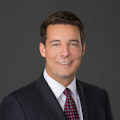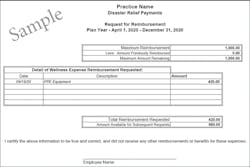Utilize tax-free COVID-19 reimbursements for you and your staff
Your practice has likely taken a hit from the economic impact of COVID-19, but there’s a silver lining you may not be aware of. A rarely used tax law provision allows tax-free reimbursements for certain coronavirus-related expenses for you and your staff. Even better, these payments are tax-deductible to your practice and tax-free to you and your staff.
A number of disaster-related provisions in the law were triggered when President Trump declared COVID-19 a federal disaster—including tax-favored disaster relief payments for you and your staff under Internal Revenue Code Section (IRS) 139.
Payments (reimbursements) made under Section 139 are not only tax-deductible to your practice but are also subject to neither income nor payroll taxes (i.e., FICA) for you or your employees. As such, reimbursements are not required to be run through payroll, nor are they included on your or your employees’ W-2 forms.
Eligible expenses
Under the law, Section 139 payments can be received for necessary personal, family, living, or funeral expenses incurred as a result of a federally declared disaster, including COVID-19. Eligible expenses include any cost associated with maintaining your home as an office—i.e., related internet or cell phone costs; office equipment or supplies purchases; increased utilities; or other teleworking costs. Furthermore, childcare costs (unreimbursed from other sources) also qualify if they allowed the employee to continue to work while their children are home from school. Moreover, out-of-pocket medical costs not covered by health insurance, such as wellness and any personal protective equipment (PPE) costs incurred, are included. Finally, funeral costs for an employee or employee’s family member are also included.
Section 139 provides a unique opportunity to receive tax-free cash from your practice. Furthermore, it can provide a very beneficial bonus for staff members, many of whom are working harder and more hours due to the coronavirus. Providing Section 139 tax-free bonuses in order to compensate staffers for their loyalty and hard work during this unprecedented pandemic can do wonders to boost their morale. This is especially important, since some staffers may have returned to work after making more on unemployment just a few short weeks ago.
Documentation required
While the IRS does not require you to have a formal Section 139 reimbursement plan in place, we recommend that you properly document your payments and keep careful records in the event of a future IRS audit. Follow these three steps to maximize the benefits received under this little-known tax provision:
Establish the amount your practice will reimburse, which expenses are eligible, as well as the time frame the benefits will be available (e.g., through December 31, 2020). See Figure 1 for an example.
Provide a disaster relief payment request form to each employee to document the expenses for which they are requesting reimbursement. Have each staff member complete the form, noting the dates, description, and amount of the expenses paid, and certifying the information to be correct.
Cut a check from your practice checking account for the reimbursement amount, designating “disaster relief payment” in the memo. Note these checks are not run through payroll but should be categorized as employee benefits on your practice financial statements. Keep a copy of the check and related reimbursement form for your records.
WES LYON, CPA, CFP, is a tax and business planning advisor. JOHN K. McGILL, JD, MBA, CPA, publishes The McGill Advisory newsletter through John K. McGill & Company, Inc., a member of the McGill & Hill Group, LLC, your one-stop resource for tax and business planning, practice transition, legal, retirement plan administration, CPA, and investment advisory services. Visit mcgillhillgroup.com.
About the Author

Wes Lyon, CPA, CFP
Wes Lyon, CPA, CFP, is a tax and business planning advisor for John K. McGill & Company, specializing in helping dentists and specialists nationwide. Wes is a graduate of Virginia Tech and holds degrees in both accounting and finance. He has obtained his Certified Public Accountant Certificate as well as his Certified Financial Planner certificate.

John K. McGill, JD, MBA, CPA
JOHN K. McGILL, JD, MBA, CPA, provides tax and business planning for dentists and specialists. The McGill Advisory newsletter is published through John K. McGill & Company Inc., an affiliate of the McGill & Hill Group LLC. It is your one-stop resource for tax and business planning, practice transitions, legal, retirement plan administration, CPA, and investment advisory services. Visit mcgillhillgroup.com or call (877) 306-9780.

